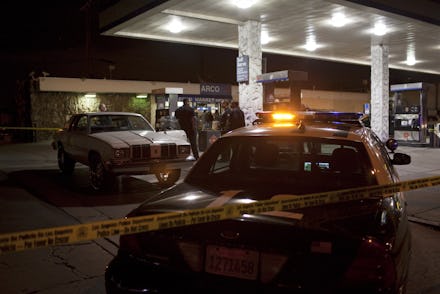No, LA Gang Members Are Probably Not Planning to Kill 100 People in #100Days100Nights

A spike of gang-related violence in South Los Angeles has led to a curious panic.
Rumors circulating online claim that, following the death of a Rollin 100 gang member named "KP," two rival gangs have gone to war both physically and on Twitter and Instagram using the hashtag #100Days100Nights. If the story is to be believed, the gangs are competing to see which can murder 100 rival gang members or innocent bystanders within 100 days.
According to the Daily Beast, an unnamed police source, as well as family members of KP, confirmed the 100-day hearsay was accurate. "The uptick in violent crime was evident, and likely tied to #100Daysand100Nights. The 77th District, which contains some of LA's most dangerous neighborhoods, witnessed 11 people shot," including a 4-year-old boy. The news also made the front page of the Los Angeles Times.
The whole story smells fishy: Rumors involving gang rites, initiations and conflicts are widespread and numerous.
Snopes, a website which tracks and evaluates urban legends on the web, has two dozen similar-sounding stories in its gang section ranging from gang initiations that require the murder of innocent people to a viral story that the Mexican Mafia was planning to kill 1,000 black men. It claims the current rumor may stem in part from a viral Tumblr post, which Snopes writes was "based on exaggerated stories, personal experience and some false assumptions."
An LAPD spokeswoman told Mic the department had detectives looking into the case, but declined to provide further information. However, LAPD South Bureau Deputy Chief Bill Scott told the Washington Post, "We are hearing that this is really not a valid posting. This situation may just be a bunch of hype." Scott added he believed the recent spike in violence was not "indiscriminate," but instead the cyclical nature of gang crime.
Meanwhile, on Twitter and Instagram, rumors flew back and forth about the nature and scale of the dispute, the territory in which innocent people would be shot and the supposed rules each gang was following during the war.
Experts advise skepticism: University of Chicago sociologist and gang expert Jolyon Ticer-Wurr told Mic via email the #100Days100Nights phenomenon had all the markings of an "urban legend" and "the narrative traveling via social media imagines a kind of random violence and retribution unlike that which characterizes typical gang violence."
Gang violence "is typically not random violence and, indeed, random violence against random and unaffiliated others would typically be seen as violating gang moral and honor codes," Ticer-Wurr said. He noted recent sociological research indicates the odds of any individual becoming a victim of gang violence tend to increase in direct association with how closely that person is affiliated with gangs.
"To even suggest that some kind of programmatic #100Days100Nights gang initiative had been articulated and would be carried out assumes a type of coherent and centralized gang leadership and an organizational structure capable of carrying forth such an initiative," Ticer-Wurr concluded. What's more, any gang organized enough to carry out such a coordinated campaign of terror (such as a major drug cartel) would presumably understand the value of discretion.
Why are people buying into this? Ticer-Wurr says rumors like #100Days100Nights proliferate during periods of social anxiety, when people worry, "the social fabric is decaying [...] and that 'ordinary citizens' (etc.) are outnumbered and losing control."
While this can happen in any society, Ticer-Wurr added the phenomenon was likely colored by ideological responses to social trends like "the decline of organized religion" and "the demographic shift towards a non-white U.S. majority population." Buying into the rumor is thus also a way of expressing political preferences — which could explain why the story has found an audience among right-wing media such as the New York Post.
Alternet's Adam Johnson was a little more blunt:
While the spike in shootings in South Los Angeles is nothing to write off, Angelenos are probably better off worrying about the chronically high poverty behind LA's gang problem than the chance a gang member will waste them in service of a hashtag.